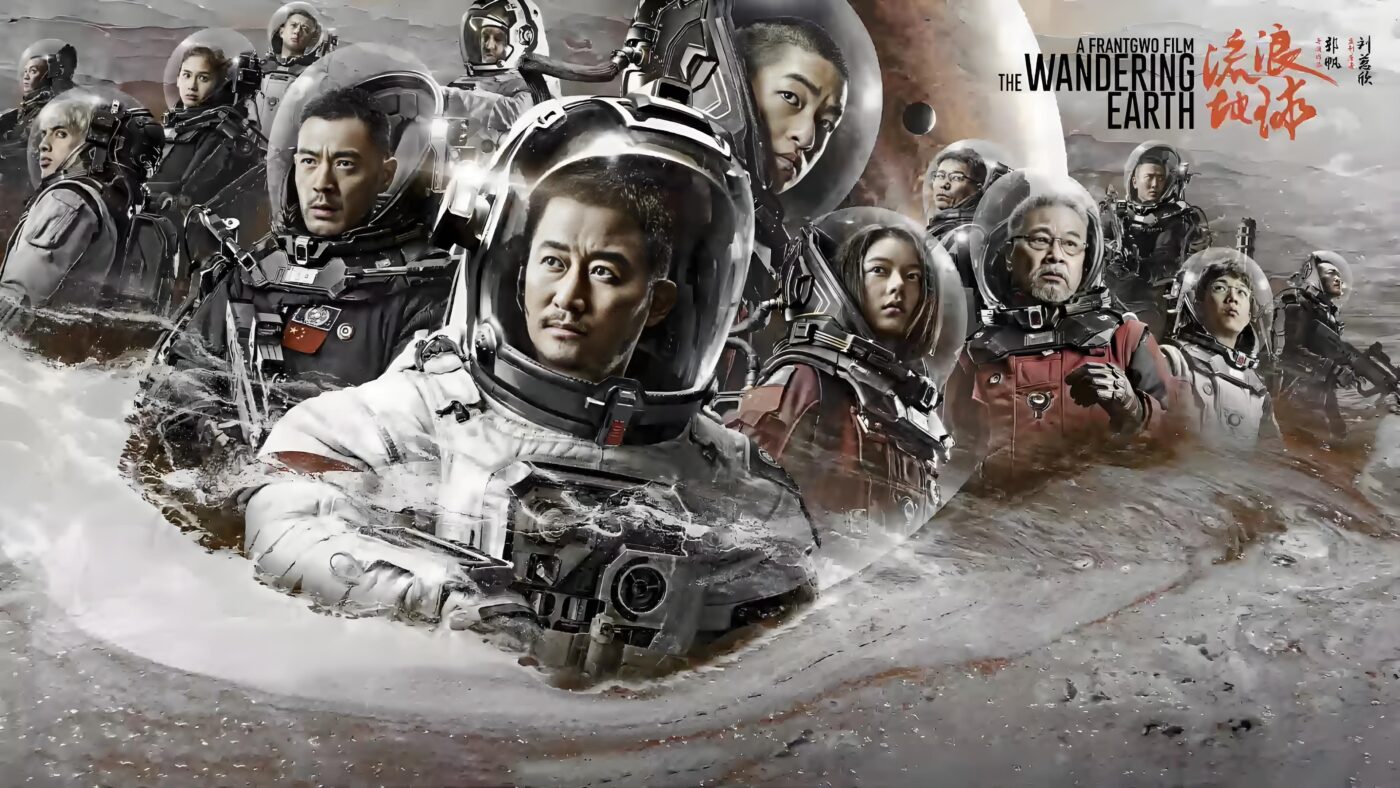Title: 流浪地球 (The Wandering Earth)
Director: Frant Gwo (郭帆)
Screenwriter: Frant Gwo (郭帆), Gong Ge’er (龚格尔), Yan Dongxu (严东旭)
Original Language: Chinese
Release Date: February 5, 2019
Genre: Science Fiction, Adventure, Drama
Running Time: 125 minutes
Main Cast:
- Wu Jing (吴京) as Liu Peiqiang
- Qu Chuxiao (屈楚萧) as Liu Qi
- Li Guangjie (李光洁) as Wang Lei
- Ng Man-tat (吴孟达) as Han Zi’ang
- Zhao Jinmai (赵今麦) as Han Duoduo
Overview
“流浪地球” (“The Wandering Earth”) is a groundbreaking Chinese science fiction film that has been lauded for its ambitious storytelling, stunning visual effects, and strong performances. Directed by Frant Gwo, the film is based on a novella by renowned Chinese science fiction writer Liu Cixin. “The Wandering Earth” tells the epic tale of humanity’s efforts to save the Earth from an impending cataclysm by moving the entire planet to a new star system. This high-stakes narrative, combined with impressive special effects and a compelling cast, has made “The Wandering Earth” a landmark in Chinese cinema and a significant entry in the global sci-fi genre.
Plot Summary
The Premise
Set in the distant future, “The Wandering Earth” presents a world where the sun is rapidly aging into a red giant, threatening to engulf the Earth and destroy all life. In response to this existential threat, the United Earth Government devises a bold and unprecedented plan: to propel the Earth out of its orbit and toward a new home in the Alpha Centauri star system.
Execution of the Plan
The execution of this plan involves constructing thousands of gigantic thrusters across the planet to generate enough force to push the Earth away from the sun. This Herculean task requires the collective effort of nations, and humanity must unite to ensure the survival of the species.
The Human Element
The story follows Liu Qi (Qu Chuxiao), a rebellious young man, and his sister Han Duoduo (Zhao Jinmai), as they navigate the perilous journey to save Earth. Their father, Liu Peiqiang (Wu Jing), is an astronaut stationed on a space station tasked with guiding the Earth through its journey. Liu Peiqiang’s mission is critical to the success of the plan, but it keeps him separated from his family for years.
As the Earth begins its journey, unexpected challenges arise, including the failure of several thrusters and the planet being pulled into Jupiter’s gravitational field. The film focuses on the efforts of Liu Qi, Han Duoduo, and their grandfather Han Zi’ang (Ng Man-tat), along with a team of international rescuers led by Wang Lei (Li Guangjie), to overcome these obstacles and avert disaster.
Climax and Resolution
The climax of the film sees the team making a desperate attempt to reignite the thrusters and escape Jupiter’s gravity. In a dramatic and emotional sequence, Liu Peiqiang sacrifices himself to activate the space station’s engines, providing the necessary thrust to save the Earth. The film ends on a hopeful note, with the Earth continuing its journey toward a new home, symbolizing humanity’s resilience and determination.
Cast and Performances
Wu Jing as Liu Peiqiang
Wu Jing, a prominent actor known for his roles in action films, delivers a compelling performance as Liu Peiqiang. His portrayal of the dedicated astronaut who sacrifices everything for the mission adds emotional depth to the film. Wu Jing’s ability to convey both the strength and vulnerability of his character makes Liu Peiqiang a memorable and relatable hero.
Qu Chuxiao as Liu Qi
Qu Chuxiao’s portrayal of Liu Qi is marked by intensity and emotional complexity. As a young man grappling with his father’s absence and the enormity of their mission, Qu Chuxiao captures Liu Qi’s rebellious spirit and eventual growth. His journey from frustration to heroism is a central element of the film’s narrative.
Zhao Jinmai as Han Duoduo
Zhao Jinmai shines as Han Duoduo, bringing youthful energy and determination to her role. Her character’s bravery and resourcefulness are crucial to the story, and Zhao Jinmai’s performance ensures that Han Duoduo is both endearing and inspiring.
Li Guangjie as Wang Lei
Li Guangjie delivers a solid performance as Wang Lei, the leader of the rescue team. His character’s leadership and unwavering resolve provide a stabilizing force in the film’s high-stakes environment. Li Guangjie’s portrayal highlights the collaborative effort required to execute the mission.
Ng Man-tat as Han Zi’ang
Veteran actor Ng Man-tat adds warmth and humor to the film as Han Zi’ang, Liu Qi and Han Duoduo’s grandfather. His character’s wisdom and support are essential to the family’s dynamics, and Ng Man-tat’s performance brings a touch of humanity to the sci-fi spectacle.
Themes and Philosophical Questions
“流浪地球” (“The Wandering Earth”) explores several themes and philosophical questions that resonate with audiences. Some of the key themes include:
Unity and Collaboration
The film emphasizes the importance of global unity and collaboration in the face of existential threats. The collective effort to move the Earth highlights the need for international cooperation and the pooling of resources and expertise to overcome seemingly insurmountable challenges.
Sacrifice and Heroism
Sacrifice and heroism are central themes in “The Wandering Earth.” Characters like Liu Peiqiang and Wang Lei exemplify the willingness to make personal sacrifices for the greater good. Their actions underscore the value of selflessness and the impact of individual contributions to collective success.
Human Resilience and Determination
The film portrays humanity’s resilience and determination to survive against all odds. The characters’ perseverance in the face of daunting obstacles reflects the indomitable human spirit and the drive to protect and preserve life.
Positive Reviews
“流浪地球” (“The Wandering Earth”) received widespread acclaim from both critics and audiences, praised for its ambitious vision, stunning visual effects, and strong performances. Some of the highlights from the reviews include:
Visual Effects and Production Design
Reviewers have lauded the film for its groundbreaking visual effects and production design. The depiction of the massive thrusters, the space station, and the various environments on Earth and in space are rendered with impressive detail and realism. The film’s visual spectacle is on par with major Hollywood sci-fi productions.
Engaging Story and Emotional Depth
The film’s engaging story and emotional depth have resonated with viewers. Critics have praised the narrative for balancing large-scale action and sci-fi elements with personal, character-driven moments. The emotional arcs of the characters, particularly Liu Peiqiang’s sacrifice and Liu Qi’s growth, add layers of depth to the film.
Strong Performances
The cast’s performances, especially those of Wu Jing and Qu Chuxiao, have received widespread acclaim. Critics have noted Wu Jing’s ability to convey the complexity of his character’s emotions, while Qu Chuxiao’s portrayal of Liu Qi captures the character’s journey from frustration to heroism. The supporting cast, including Zhao Jinmai and Ng Man-tat, also deliver memorable performances.
Ambitious Vision
“The Wandering Earth” has been praised for its ambitious vision and scope. The film’s bold premise of moving the Earth to a new star system is both imaginative and thought-provoking. Critics have commended the filmmakers for pushing the boundaries of Chinese cinema and contributing to the global sci-fi genre.
Negative Reviews
Despite its overall positive reception, “流浪地球” (“The Wandering Earth”) has faced some criticism. Common points of critique include:
Pacing and Length
Some reviewers have noted issues with the film’s pacing and length. The movie’s rapid progression through complex plot points can feel rushed at times, leading to moments where the narrative may be difficult to follow. Additionally, the film’s length has been mentioned as a drawback, with some viewers feeling that certain scenes could have been trimmed to improve the pacing.
Character Development
While the film’s visual spectacle and high-stakes narrative have been praised, some critics have pointed out that character development is occasionally sacrificed for action and plot advancement. Certain characters, particularly in the supporting cast, could have benefited from more screen time and deeper exploration of their backgrounds and motivations.
Cultural Impact
“流浪地球” has had a significant cultural impact in China and globally. The film’s success at the box office, coupled with its positive reception, has solidified its status as a milestone in Chinese cinema. “The Wandering Earth” is credited with revitalizing interest in Chinese science fiction and showcasing the country’s potential in producing high-quality sci-fi films.
The movie’s themes of unity, resilience, and determination have resonated with audiences, making it a topic of discussion and analysis in various media. The film has also sparked interest in Liu Cixin’s literary works, contributing to the growing popularity of Chinese science fiction literature.
Production and Direction
Directed by Frant Gwo and based on Liu Cixin’s novella, “The Wandering Earth” benefits from a strong creative vision. Frant Gwo’s direction ensures that the film maintains a balance between its large-scale sci-fi elements and personal, character-driven moments. His ability to create a cohesive and engaging narrative amidst the film’s complex premise is a testament to his skill as a filmmaker.
The screenplay, co-written by Frant Gwo, Gong Ge’er, and Yan Dongxu, captures the essence of Liu Cixin’s story while adapting it for the screen. The writers’ ability to weave together the film’s various plot threads and themes ensures that the story remains compelling and thought-provoking.
The film’s production design and visual effects, led by a team of talented artists and technicians, bring the ambitious vision of “The Wandering Earth” to life. The detailed and realistic depiction of the thrusters, space station, and other sci-fi elements enhances the film’s immersive experience.
Music and Soundtrack
The film’s soundtrack, composed by Roc Chen, complements the narrative with a mix of orchestral and electronic elements. The music underscores key emotional moments and adds to the overall atmosphere of the film. The score’s ability to convey both the grandeur of the sci-fi spectacle and the intimate, personal moments of the characters enhances the film’s impact.
Conclusion
“流浪地球” (“The Wandering Earth”) is a landmark film in Chinese cinema, celebrated for its ambitious vision, stunning visual effects, and strong performances. Wu Jing’s portrayal of Liu Peiqiang, supported by a talented cast and a skilled production team, ensures that “The Wandering Earth” will leave a lasting impact on its audience.
As viewers follow the epic journey to save the Earth, they are invited to reflect on themes of unity, resilience, and the power of collective effort. “The Wandering Earth” is more than just a sci-fi adventure; it is a profound exploration of the human spirit and the lengths we will go to ensure the survival of our species. This film stands as a testament to the power of storytelling and the enduring appeal of science fiction.
With its clever script, relatable themes, and memorable performances, “The Wandering Earth” continues to resonate with audiences, making it a beloved classic in contemporary Chinese cinema. The movie’s success and cultural impact highlight its significance as a touchstone for both entertainment and introspection, offering viewers a chance to marvel at the possibilities of the future while appreciating the resilience of the human spirit.

